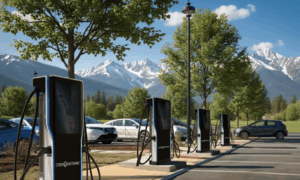
Home / EV Charging News / Electric Cars and Emergency Preparedness: Highlighting the advantages of electric vehicles in emergency situations, such as power outages and natural disasters, and their potential role in emergency response and resilience
Electric vehicles (EVs) are not only transforming the transportation landscape but also have the potential to play a significant role in emergency preparedness and response. As the world faces increasing challenges from power outages, natural disasters, and other emergencies, electric cars offer unique advantages that can contribute to enhanced resilience and response efforts. In this article, we will highlight the advantages of electric vehicles in emergencies and explore their potential role in emergency response and resilience.
One of the primary advantages of electric cars in emergencies is their ability to operate independently from the traditional power grid. Electric vehicles are equipped with high-capacity batteries that can store a significant amount of energy. In the event of a power outage, electric car owners can use their vehicles as a reliable source of backup power. With the help of vehicle-to-grid (V2G) technology, electric cars can supply electricity to homes, emergency shelters, or critical infrastructure, providing a temporary power source during an outage.
During emergencies, access to fuel for traditional combustion engine vehicles may become limited or disrupted. However, electric cars rely on electricity, which is widely available through various means, including charging stations, solar panels, and portable generators. This accessibility to electricity ensures that electric vehicles can continue operating even when fuel supply chains are disrupted. Additionally, the expanding network of charging infrastructure facilitates charging during emergencies, providing a reliable means of keeping electric cars on the road.
In emergency situations, the environment can be significantly impacted. Traditional vehicles powered by internal combustion engines contribute to air pollution and greenhouse gas emissions. Electric cars, on the other hand, produce zero tailpipe emissions. By using electric vehicles in emergency response and transportation, the environmental impact can be reduced, helping to maintain air quality and mitigate the effects of the emergency situation.
Electric vehicles act as mobile energy storage units, equipped with high-capacity batteries that can store large amounts of energy. This energy storage capacity can be harnessed during emergencies to power critical equipment and devices. For example, electric cars can be used to charge medical equipment, communication devices, or provide temporary power for emergency operations. The versatility of electric vehicle batteries contributes to the overall resilience of emergency response efforts.
In emergency situations, time is of the essence. Electric vehicles offer rapid mobility for first responders, enabling them to navigate through traffic or reach affected areas more quickly. With their instant torque and acceleration, electric cars can swiftly transport emergency personnel, medical teams, and supplies to the scene of an incident. The quiet operation of electric vehicles can also be advantageous in situations where noise reduction is necessary, such as search and rescue operations.
Electric cars can be transformed into mobile power stations, providing on-site power during emergency response operations. With V2G technology, electric vehicles can supply electricity to emergency command centers, field hospitals, or other facilities where power is crucial. This capability ensures a reliable source of energy, enabling the smooth operation of essential equipment, communication systems, and lighting in the immediate aftermath of an emergency.
Electric vehicles can be equipped with advanced communication systems that facilitate vehicle-to-vehicle communication. In emergency situations, this technology enables efficient coordination among emergency responders and aids in managing traffic flow and evacuations. Vehicle-to-vehicle communication can enhance overall response efforts by providing real-time information, optimizing routes, and ensuring a coordinated approach to emergency operations.
To harness the full potential of electric vehicles in emergencies, the establishment of community charging infrastructure is crucial. Public charging stations strategically located in areas prone to emergencies, such as near hospitals, emergency shelters, and critical infrastructure, can ensure access to charging during power outages or disruptions. This infrastructure strengthens community resilience by supporting the uninterrupted operation of electric vehicles during emergencies.
Collaborations between emergency management agencies and the electric vehicle industry can further enhance emergency preparedness and response. By working together, these stakeholders can develop protocols, training programs, and resources specifically tailored to the use of electric vehicles in emergencies. This collaboration can also involve sharing data and insights to optimize emergency response strategies and identify areas for improvement.
Raising public awareness about the advantages of electric vehicles in emergencies is essential for building resilience. Educational campaigns can inform individuals and communities about the benefits of electric cars as backup power sources, their environmental advantages, and their potential role in emergency response efforts. This awareness empowers individuals to make informed choices when it comes to emergency preparedness and encourages the adoption of electric vehicles as part of a resilient lifestyle.
Electric vehicles offer unique advantages in emergencies, such as power independence, fuel accessibility, reduced environmental impact, and enhanced resilience through energy storage. Their role in emergency response includes rapid mobility for first responders, the provision of mobile power stations, and vehicle-to-vehicle communication. By building charging infrastructure, fostering collaborations, and promoting public awareness, electric cars can contribute significantly to emergency preparedness and response efforts, creating more resilient communities.



